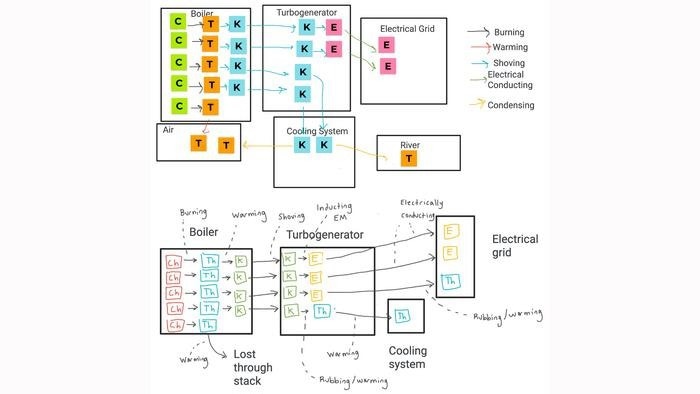Large-scale energy generation initiatives are influenced not only by the accessibility of natural resources and raw materials but also by economic and political factors. Furthermore, the impact of power plant operations extends well beyond electricity production, giving rise to a diverse array of scientific, ethical, ecological, and cultural consequences across various levels, including local, regional, state, national, and global scales.
 Energy tracking diagrams drawn by physics teachers in a study examining equity in energy. The authors developed the diagrams in alignment with the Next Generation Science Standards to show the movement of energy within a power production system. Their latest work asks physics teachers to expand the analysis from factors within an energy system (power plant) to the variety of interconnected systems outside, from raw materials to the state of the land after decommissioning. Image Credit: Rachel E. Scherr, Lane H. Seeley, and Kara E. Gray
Energy tracking diagrams drawn by physics teachers in a study examining equity in energy. The authors developed the diagrams in alignment with the Next Generation Science Standards to show the movement of energy within a power production system. Their latest work asks physics teachers to expand the analysis from factors within an energy system (power plant) to the variety of interconnected systems outside, from raw materials to the state of the land after decommissioning. Image Credit: Rachel E. Scherr, Lane H. Seeley, and Kara E. Gray
In a recent article published in The Physics Teacher, a journal jointly published by AIP Publishing and the American Association of Physics Teachers, researchers from the University of Washington Bothell and Seattle Pacific University emphasized the importance of incorporating contextualized physics principles into education.
They detailed how educators effectively integrated case studies into their teaching methodologies to provide insights into energy-related topics and the real-world dynamics of power plants.
During the pandemic, a lot of us had a re-examination of the education that we were offering, a chance to really look at why it is important and what its purpose is. Ultimately, science education should be providing a basis for decision making, and we should be enabling students to participate in scientifically responsible decisions that affect their lives and their communities.
Rachel Scherr, University of Washington Bothell
Scherr and her team present the most recent developments from their ongoing, multi-year initiative aimed at assisting physics educators in adopting innovative teaching methods that bridge the gap between students and the practical aspects of physics in the real world.
Their research delves into how a group of teachers put this comprehensive approach into practice by exploring the societal and cultural consequences of Plant Scherer in Georgia. Furthermore, the authors considered the experiences of students enrolled in a course that examined various facets of the Skagit River Hydroelectric Project, encompassing topics such as relicensing, community opposition, salmon relocation engineering, and tribal restoration projects.
We’ve been supporting teachers for a few years now to really think about the equity issues related to power plants and the role of equity in community decision making. Equity has to do with not just the power plant itself, but the relationship of the power plant to the lands and waters and air that surround it, as well as human, plant, and animal communities.
Rachel Scherr, University of Washington Bothell
Their efforts serve as a prime example of how eliminating the abstraction from physics education and re-establishing the link between power plants and the broader world equips students with the knowledge and skills necessary to actively participate in community decision-making processes and comprehend the multifaceted social and cultural dimensions of energy.
Technology, infrastructure, and energy resource decisions are partly scientific decisions, and classes that prepare young people to participate in decision making is a shared value for scientists. There is so much to be gained from placing these kinds of analyses in their context, where they have consequences for people and for the natural world. It’s a natural extension that helps to make the physics we learn meaningful.
Rachel Scherr, University of Washington Bothell
Journal Reference:
Scherr, R. E., et al. (2023). Energy in Its Material and Social Context: Power Plants. The Physics Teacher. doi.org/10.1119/5.0111211.